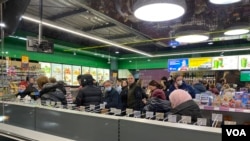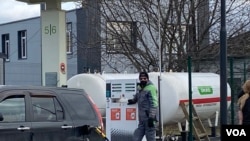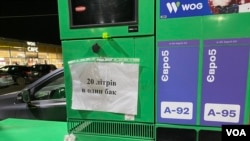LVIV, UKRAINE — Exhausted faces drained by sleeplessness. Bewildered children who still offer a wan smile.
Families huddled in Kyiv Metro stations or sleeping and living in underground parking garages to escape shot and blast and venturing out only for quick bathroom breaks or to grab food.
Evacuating families pulled over in cars to the side of crowded roads to get some rest from hours-long and even days-long personal odysseys to get to once-easily reached neighboring borders. Those frontiers now seem to be on the far side of the planet — and zooming further away with each kilometer slowly traveled.
This is war, too: the young tearfully saying goodbye to parents and grandparents who are too infirm or cussed to leave their homes. And, anyway, they want to remain rooted in these uproarious times.
This is what Ukraine’s war looks like as we worked our way out of Kyiv, skirting alarms and distant blasts and adjusting our route because of road closures or reports — some false, some accurate — of military action, or the threat of it, just ahead of us.
The journey west became trickier by the hour with the closures of roads by the Ukrainian military, which is trying to free them up so they can ferry rapidly to frontlines munitions coming from Ukraine’s friends to feed the defense of the country — and to do everything to hold Kyiv, a capital that took Germany’s Nazi forces during the Second World War from 7 August to 26 September 1941 to subjugate.
As we drew nearer to Vinnytsia in central Ukraine, navigation became especially challenging when the Ukrainian military feared Russian tanks might move south from Zhytomyr and as a consequence, they shut down more roads.
Our 20-hour journey from Kyiv to Lviv was broken only once and because of the kindness of a middle-aged woman, Oksana, who took us in — me, my fixer and three Ukrainian friends — so we could snatch some sleep. The next morning, she fed us bowls overflowing with oatmeal, strong coffee, and fruit. Oksana, who cares for an infirm father in a cramped apartment, flatly refused money for the hospitality: and we equally flatly refused to take no for an answer.
On our way — through the steppes of Central Ukraine, easy territory for tanks and then eventually climbing the hills towards Lviv — we saw a country on the move, although moving tortuously, agonizingly slowly.
This wasn‘t a flight but a crawl.
We saw families foraging for gas and food and water by roads snarled and clogged with Ukrainians fleeing the crash and thump of ordnance. Their cars creaked with the weight of stacked luggage, bags spilling over with hastily gathered essentials as well as mementos and treasured children’s toys. Startled family pets were stuffed in any space available — or, because there just wasn’t any room, held by flagging hands.
Hundreds of thousands of Ukrainians are on the move heading for neighboring borders — Poland, Moldova, Romania, Slovakia — fleeing the roar and hurtfulness of guns and missiles and to save those very same bewildered children who shoot total strangers a smile.
The U.N.’s relief agency reported on Sunday that since the invasion 370,000 Ukrainians had crossed the country’s western borders, 187,000 at Polish border crossings. Some humanitarian workers fear that four million or more could flee if the war prolongs. That is a frightening prospect and dwarfs the refugee exodus and displacement of 1.3 million during the Balkan conflict of the 1990s.
Already journeys that normally take four or five hours are taking much longer. For some, getting from Kyiv to Lviv by car is taking two or three days — a trip complicated by the sheer volume of people and vehicles on the move on the country’s notoriously inadequate road system, now burdened and sagging under the weight of an unfolding humanitarian crisis that will only worsen if war is protracted.
And all along the way people ask themselves, each other, and us the same questions: When will we get there? Where is there, anyway? Will the war end soon? Will the Western countries send soldiers, guns, and planes? Will we see our homes again? Will I see my parents and grandparents again?
Will they be kind to us when we reach wherever we are going?
At two highway gas stations opposite each other near Khmelnytsky, a town leading to western Ukraine, the forecourts were stuffed with cars, their drivers trying to refuel, some waiting patiently, others not; and those able to get more gas left calculating how far they could get on the government-dictated 20-liter ration at the pumps.
It was there I talked with 18-year-old Anna, who was supervising her ten-year-old and eight-year-old sisters. They kept interjecting with the few English words they’ve been learning at school. They had come from even further away than Kyiv and had been traveling for days — two with no real sleep — from Mariupol, the port city in south-east Ukraine, now besieged and being shelled by Russian forces.
“My father wanted to get us to safety, and we were too scared to stay,” she said. “We are going to Lviv and then where, I don’t know,” she added. She said her sisters were able to doze in the car, but she couldn’t. “Yes,” the two small girls chorused as we talked — an affirmative that alternated with “hello.”
The highway food stores are full of evacuees trying to grab food and water. Long lines form outside their bathrooms. Many gas stations are closed because they have run out of gas or diesel.
As the battles rage in Kyiv, evacuees search for ever more circuitous and improvised routes west, along potholed, bone-juddering unproven roads normally only used or known about by farmers and villagers. The locals look astonished at the long lines of urban cars trying to navigate them, scanning the tag numbers and seeing they are coming from everywhere — Donetsk, Dnipro, Kharkiv, Kyiv, Odesa and Mariupol.
And then they go back to feeding livestock and placing flowers at the graves of relatives in small villages -- familiar everyday tasks in a world no longer familiar.
As our journey progressed, we saw more improvised checkpoints being thrown up, manned by local police and enlistees in new territorial defense units, or guarded by self-styled volunteers determined to be ready for any Russian forces that may appear in their village of just a handful of whitewashed, single-story, tin-roofed houses.
At one checkpoint outside a village near the town of Ternopil, I saw paunchy old farmers toting old hunting rifles questioning two men they suspected initially of being saboteurs.
Avoiding the roads and trying to go west on the free trains or on the few remaining scheduled services is also an odyssey. The trains are packed. Khalid, a 28-year-old Lebanese consultant married to a Ukrainian, told me he had managed to drive from Kyiv to Vinnytsia, where he boarded what was meant to be a cross-country train to Warsaw.
“I had to stand for almost eight hours in the train,” he said. “I gave up my seat to an old woman. I told her, ‘Come sit here.’ Everyone was packed together — forget COVID. Nobody was wearing masks or anything like that,” he said. Once they got to Lviv, the train stopped. “We were ordered off. And there was pandemonium,” he said.
Khalid added: “You know what? Unfortunately, many brave people are fighting for the flag, others are fighting to get their children to safety. And then there are some who are making a business out of it. If you get a taxi, they start scamming you. You are seeing inflation like never before with costs going through the roof. It’s just a disaster. And if the situation continues like this, you are going to witness an Afghanistan Part II.”
At the border near Lviv the lines are indeed lengthening. Local officials say there’s a tailback of 35 kilometers already, and the wait is around two days to cross.
But while there are some who cash in on the misery, there are many others like Oksana who bustle about offering hot tea, food and shelter for the evacuees as they wait to find out if the people where they eventually get to will be kind to them, too.






